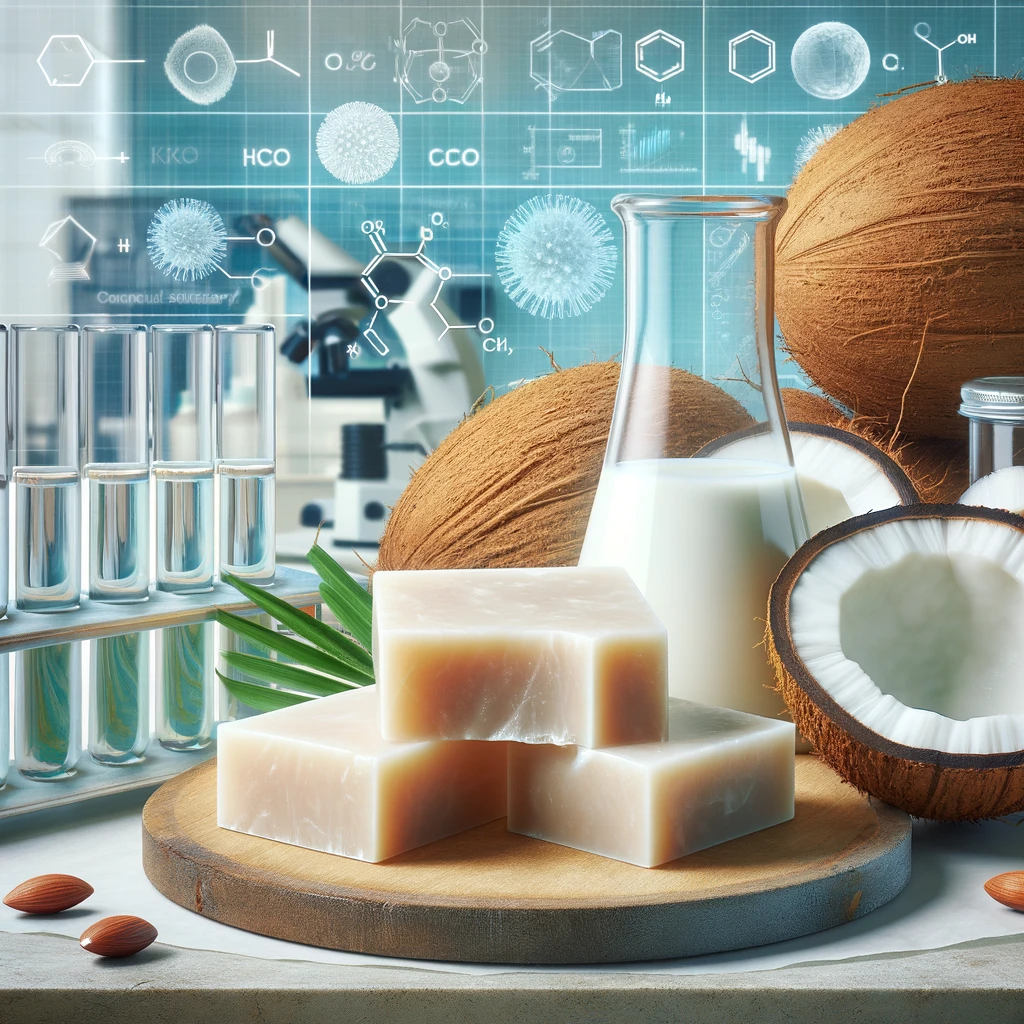The Science behind Fatty Acids in Coconut Milk
You might be asking, "Is coconut milk soap good for your skin?" The answer lies in its unique molecular structure and we will explore this with you.
Saturated fatty acids in coconut milk, especially lauric acid, have a unique molecular structure that makes them effective at trapping and removing dirt and oil from the skin. When combined with lye in the soap-making process, these fatty acids undergo saponification, turning into soap molecules that are amphiphilic – they have both water-loving (hydrophilic) and oil-loving (lipophilic) properties. This allows them to interact with both water and oil, effectively cleansing the skin by lifting and washing away dirt and sebum.
Benefits for Skin: The high fatty acid content helps maintain the skin's natural barrier and protects against environmental pollutants and bacteria. Lauric acid, in particular, is known for its antimicrobial properties, which can help in keeping the skin clear and reducing acne-causing bacteria.
Moisturizing Properties and Nutrients
Hydration: One of the vital benefits you get when you use coconut milk in soap is its remarkable hydration properties. The natural oils in coconut milk are emollients, which help fill in gaps in dry skin, making it feel smooth and hydrated. These oils also form a barrier on the skin’s surface, reducing moisture loss.
Nutritional Benefits: There is the question, "What does coconut milk do in soap?" It has a nutritional profile, including vitamins C and E, which are antioxidants that protect the skin from damage by neutralizing harmful free radicals. B-vitamins aid in skin regeneration and repair. The minerals in coconut milk, like selenium, play a role in maintaining skin elasticity and protection.
Coconut Milk Offers Gentle Cleansing
Why It's Gentle: "Is coconut milk soap good for you?". Yes! By now you are probably noticing all the benefits coconut milk as a soap ingredient can offer, and it's very good particularly for sensitive skin. The molecular setup of the fatty acids in coconut milk allows them to cleanse without stripping the skin of its natural oils. This allows the skin to retain it's moisture and pH balance.
Historical Use: Coconut milk has been used for centuries in tropical regions as a gentle cleansing agent in traditional remedies and skincare routines.

Coconut Milk Aids the Soap's Rich Lather
Creating a Luxurious Lather: The saturated fats in coconut milk help to create a dense and creamy lather in soap. The lather's quality depends on the balance of fatty acids; coconut milk offers a good blend that creates a rich, satisfying foam.
Hydration and Moisturization
Locking in Moisture: Another thing you might ask, "What is coconut milk soap good for?". It locks moisture into your skin. The natural oils in coconut milk form a barrier on the skin that helps to lock in moisture, preventing dehydration and dryness. This is particularly beneficial for those with dry or flaky skin.
Soothing Effect
Calming Properties: Addressing concerns like "What does coconut milk do in soap?" its soothing properties play a significant role. Coconut milk contains anti-inflammatory compounds that can help soothe irritated skin, reduce redness, and calm conditions like eczema and psoriasis.
Impact on Soap Properties
Creaminess, Hardness, Color and Texture: Coconut milk lends to the soap's creaminess, hardness, and texture. The creamy texture is due to the high-fat content in coconut milk. This gives it a luxurious feel, making it satisfying to use. Coconut milk can affect the soap's hardness based on its interaction with other ingredients. For instance, in combination with harder oils, it can contribute to a firmer bar. Coconut milk influences the color of the soap, giving it a warm, creamy, inviting appearance. The texture tends to be smoother and more uniform.
Usage in Soap Making Process
Proportion, Mixing with Lye, Cold Process Method: A common inquiry about coconut milk soap revolves around its usage in the soap making process, particularly regarding proportion and interaction with lye. The proportion impacts the soap's characteristics - too much coconut milk can result in a softer bar, while too little may not provide the desired moisturizing effects. The sugars in coconut milk can react with lye, causing a rapid increase in temperature. Chilling the milk minimizes this reaction, ensuring a smoother soap-making process. The natural sugars can increase the saponification temperature. Keeping the soap cool prevents overheating, which can affect the final texture and appearance of the soap.
Considerations and Tips
Allergic Reactions: When considering if "coconut milk soap is good for you?", consider the potential for allergic reactions. Coconut is a common allergen for some individuals. It's crucial to be aware of this, especially if you're selling or gifting these soaps, to ensure that they are suitable for everyone's use.
Shelf Life: Another key consideration in using coconut milk in soap is its impact on the product's shelf life. Fresh ingredients like coconut milk can reduce the soap's shelf life. Typically, soaps with coconut milk should be used within a few months to ensure their quality and effectiveness. The presence of natural ingredients, while beneficial for skin care, can also lead to a shorter usable period due to potential spoilage.
